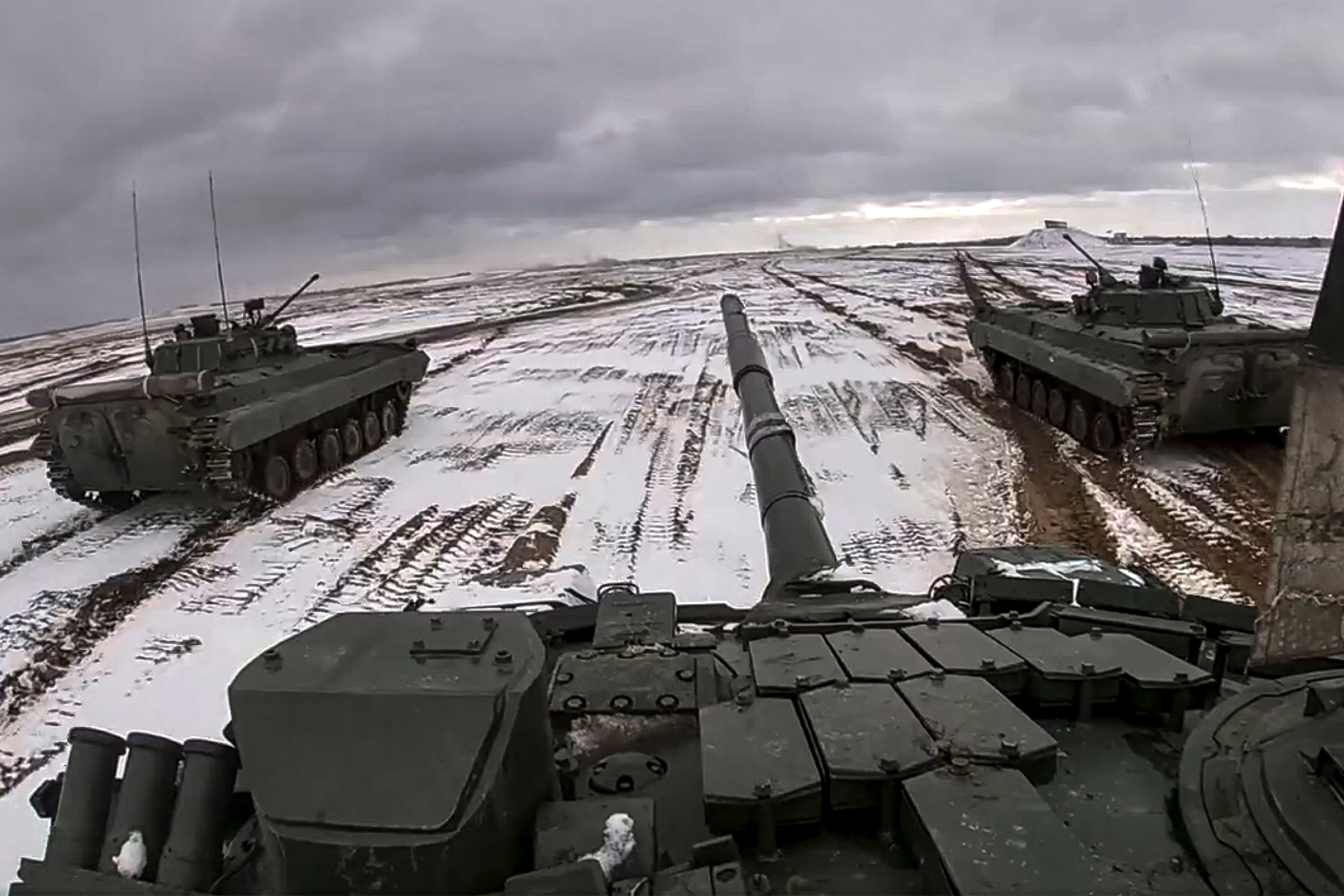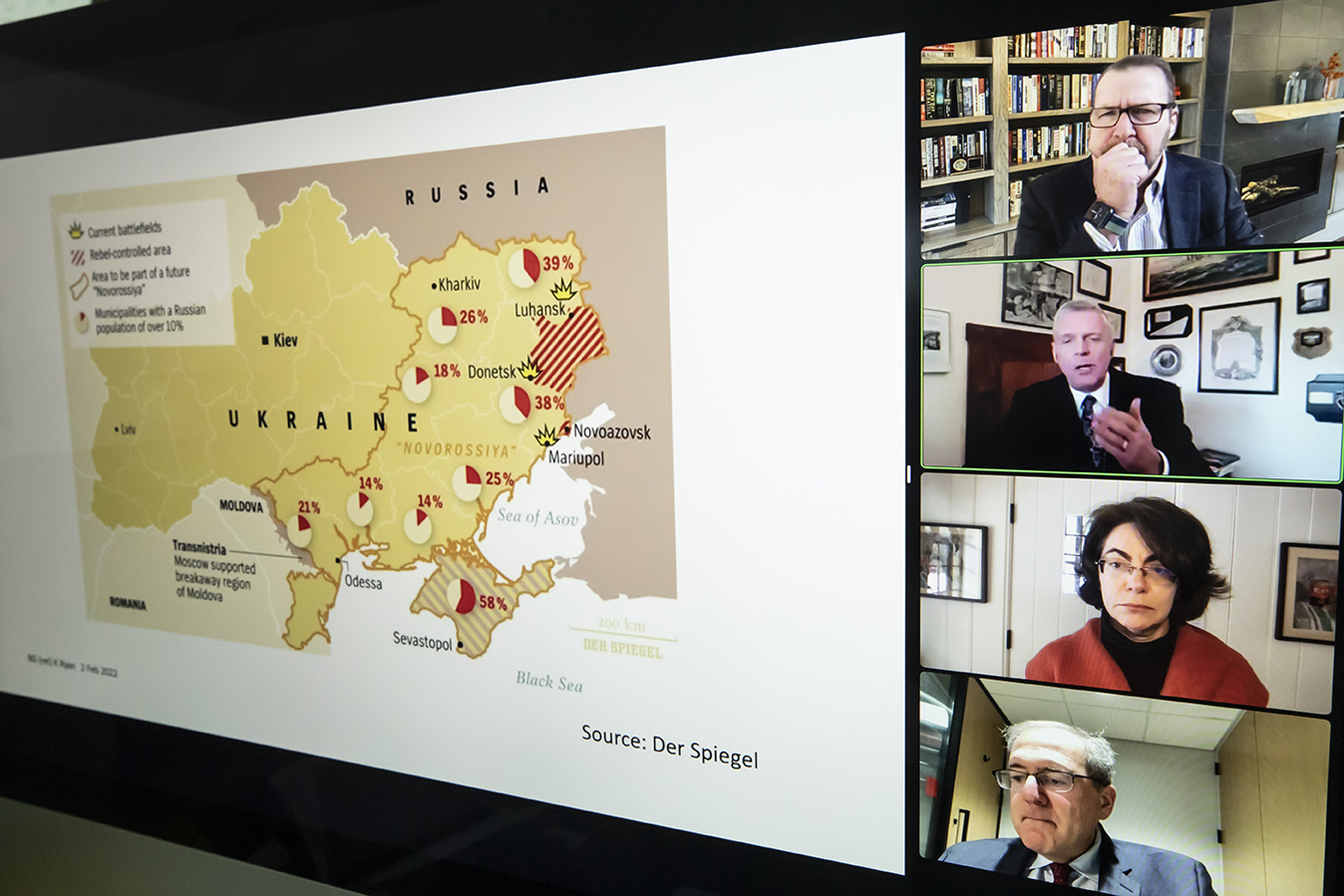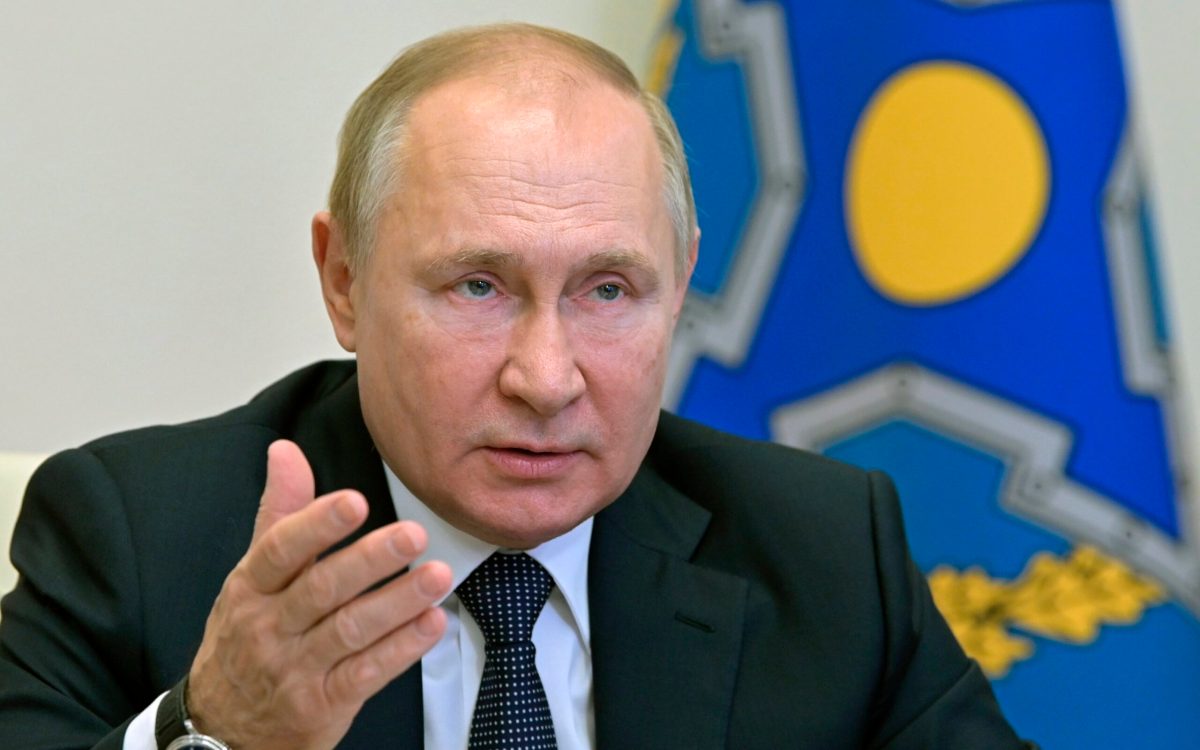
Russian and Belarus troops held joint combat training on Wednesday as tensions remain high under the looming threat of war with Ukraine.
Russian Defense Ministry Press Service via AP
What’s Putin’s next move?
Kennedy School experts game out various scenarios, look at what he stands to gain, lose
With more than 130,000 Russian troops massed on Ukraine’s borders with Russia and Belarus, U.S. and NATO diplomats have been negotiating with Russian officials to avert a ground war on the European continent as world leaders await Russian President Vladimir Putin’s next move.
Analysts with expertise in Russian politics and national security said at a Harvard event on Wednesday that Putin has much to gain by pushing into Ukraine and that now could be an opportune time to do it — but that doesn’t mean he will. The group assessed the delicate, complicated state of affairs and offered theories on how things may play out during the event hosted by Paul Kolbe, director of the Intelligence Project at the Belfer Center at Harvard Kennedy School.
Putin’s goals and demands are multifaceted and though unrealistic, not entirely illegitimate, said Alexandra Vacroux, Ph.D. ’05, executive director of the Davis Center for Russian and Eurasian Studies and lecturer in the Government Department at Harvard.
She said his aims include securing Russian access to the European energy market with completion of the Nord Stream 2 gas pipeline to Germany to protect Russian tax revenues generated from hydrocarbon exports, which will in turn allow the government to maintain Russian standards of living and help quell domestic unrest. U.S. and German officials have warned that the project will not move forward if Russia invades.
In addition, Putin wants to get NATO to ban Ukraine from ever joining the defense alliance and to move NATO troops westward, back to where they were in 1997; demand that the West respect Russia as a great power, equal to the U.S. and China; and secure his legacy as a heroic figure in Russian history before he leaves office by fixing the mistake made by Russian leaders at the end of the Cold War.
Though NATO will not agree to withdraw its forces, the closeness of NATO forces to Russia’s western and southern borders is “a legitimate security concern” for Russia, Vacroux said.
So why act right now? The Russian military has recently modernized and is fairly strong, while Ukraine’s military, which was weak and poorly trained during Russia’s annexation of Crimea in 2014, has also grown substantially and improved. With NATO advisers and equipment flowing into Ukraine, Russia may see the window closing on its advantage and want to strike while it can. Putin also sees that Europe is not united on what to do and views President Biden as politically weak and distracted with domestic politics, she said.

Putin has nothing to lose from continuing to build up forces through February, says David E. Sanger (bottom). “The question is, how long can he stay out there?” Joining Sanger was moderator Paul Kolbe (from top), Kevin Ryan and Alexandra Vacroux.
Rose Lincoln/Harvard Staff Photographer
Indeed, it was China, not Russia, that was the focus of the Biden administration early on, angering Putin. But since recognizing the Ukraine buildup as a potential national security threat in December, Biden has taken an aggressive posture toward Russia, demanding that Putin either state his intentions or back down, said David E. Sanger ’82, a White House and national security correspondent for The New York Times and an adjunct lecturer at HKS.
Though it’s “too early to tell” whether that strategy will prompt Russia’s retreat, Sanger said Putin’s unusually subdued tone during a press conference on Tuesday suggests that he had been caught off guard by the move and may be one of the factors he’s weighing in his decision about further military action.
At that gathering, Putin struck a less-strident tone as he complained about the buildup of Western defensive forces in the region as deliberate provocations designed to force Russia into a conflict with Ukraine. With President Xi Jinping of China scheduled to meet with Putin on Friday in Beijing after the start of the Olympics, China appears to be signaling it will once again support Russia in the event of new Western sanctions.
Sanger said that other theories suggest Putin is not looking for a face-saving off-ramp but merely waiting until the Olympics conclude in late February so as not to embarrass China and to ensure the ground in Ukraine is fully frozen so the Russians can safely move heavy armaments into place and complete its preparations.
More like this
Another theory is that Russia’s military buildup is merely leverage to strong-arm defensive concessions from NATO and the U.S., and that fighting a long and bloody ground war in Ukraine is not what Putin is after.
“Putin’s only real goal here is to destabilize [pro-Western Ukrainian President Volodymyr] Zelensky’s government and put a puppet government or at least a friendly government in place,” Sanger said, leaving Russia-friendly leaders in charge of Ukraine, Belarus, and Kazakhstan. “That wouldn’t restore the old Soviet Union, but boy, it would be a step to beginning to assemble the old team,” he said.
What happens next is still unclear, of course. The panel agreed that tensions will remain elevated and dangerous in the coming weeks, and that Putin’s talks with the West will do little to change the trajectory of events.
Because NATO will never accede to Putin’s demands, Brigadier Gen. Kevin Ryan (ret.), a former deputy director for Army Strategy, Plans and Policy at the Pentagon and now a senior fellow at the Intelligence Project, said he doesn’t see any other way the Russian leader can exert some control over the flow of NATO aid to Ukraine except through military force. Putin’s objectives can be accomplished without a full-scale taking of Ukraine, he added.
“He’s got nothing to lose from continuing to build up through the month of February. All he does is gain leverage,” said Sanger. “The question is, how long can he stay out there?”
Sanger speculates that Putin would be more likely to first take plausibly deniable cyber and paramilitary actions and see how far that takes him before launching a full-scale traditional ground war.
“The big question is: Will this rather aggressive pushback [by the U.S.] keep those troops where they are, or result in a gradual movement back home for them? Can Putin do that and still call this a win?” said Sanger. “And we just don’t know the answer to that yet.”





